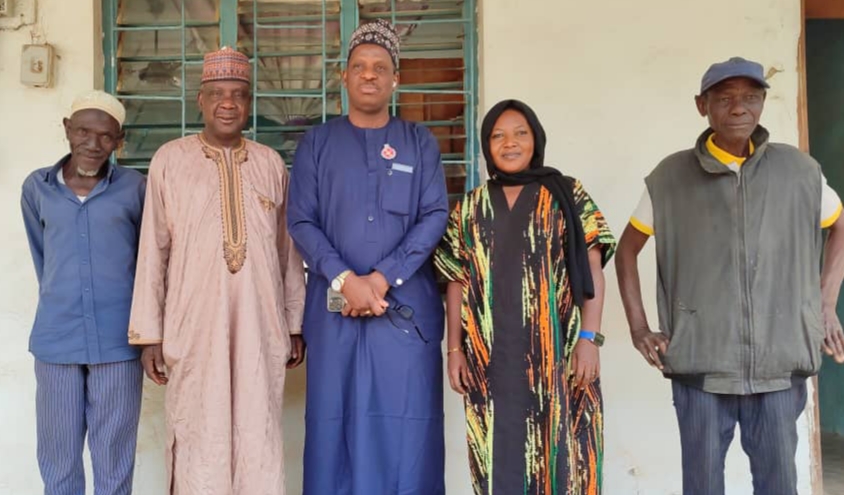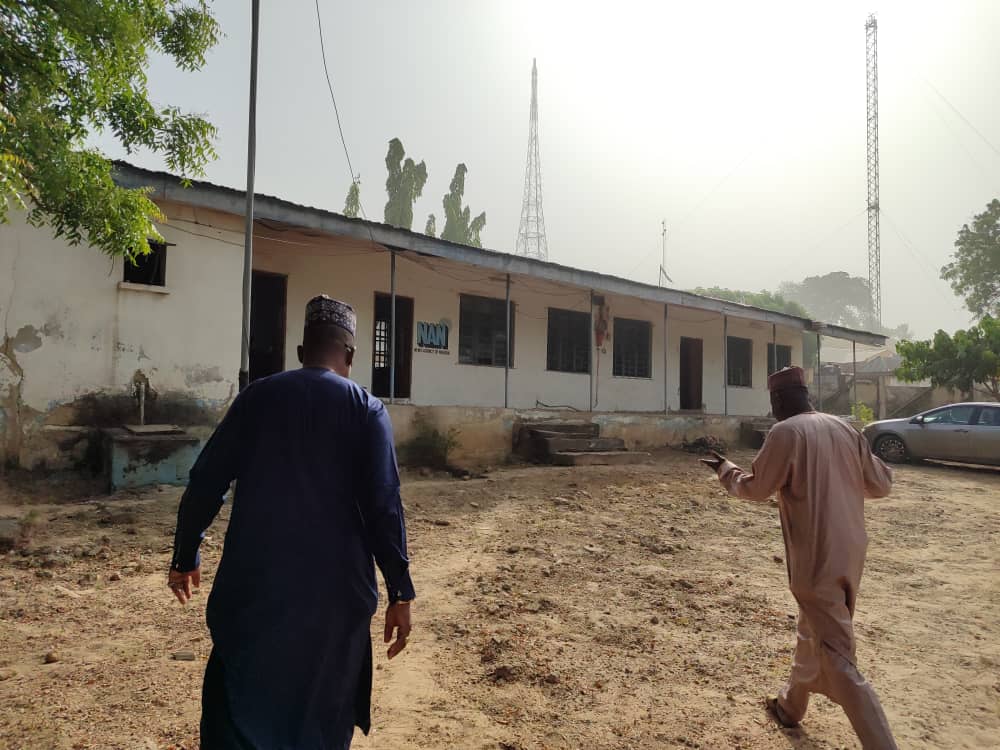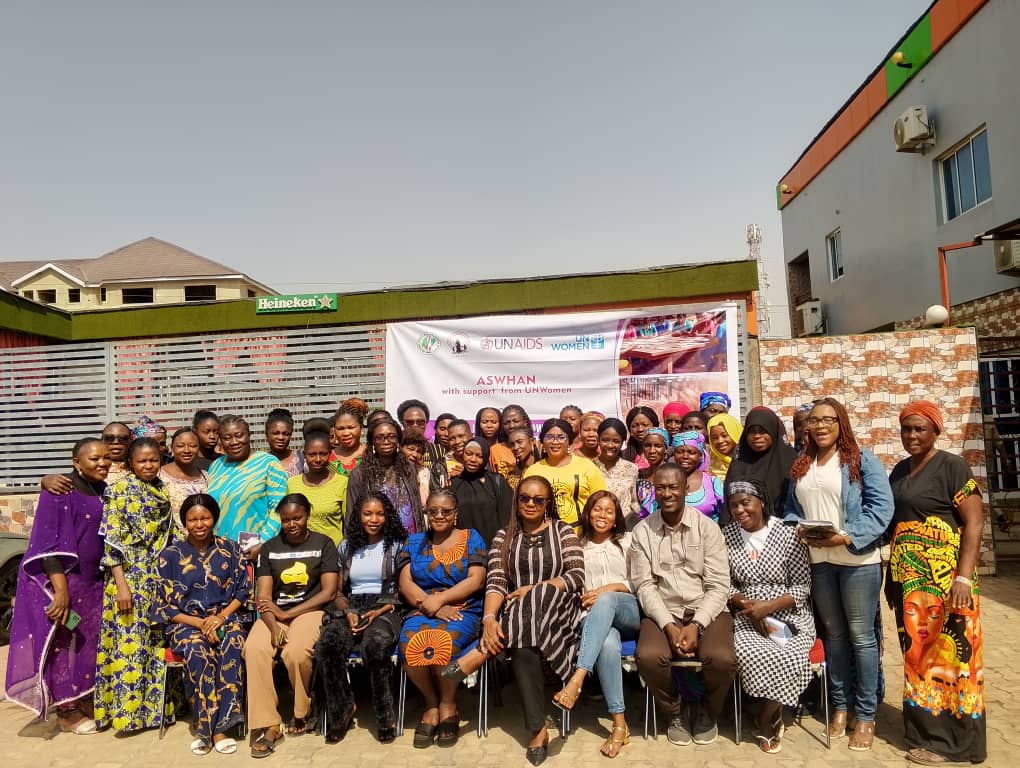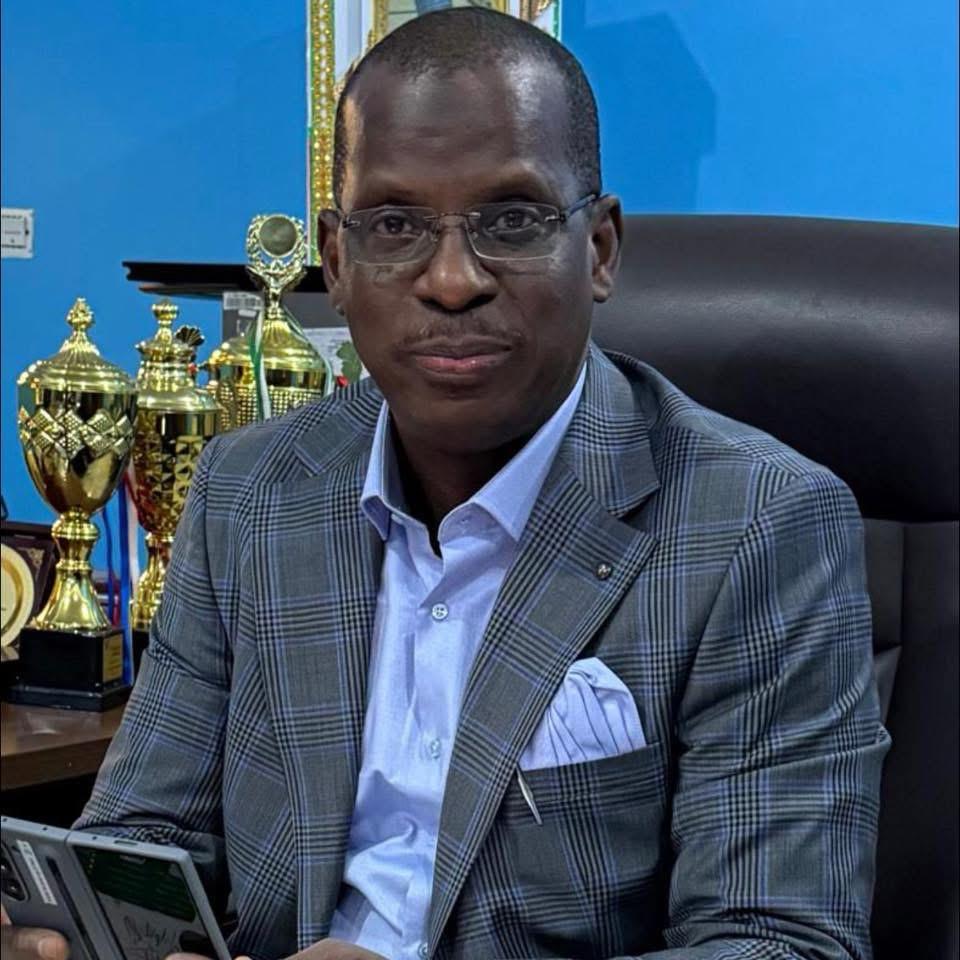NAN MD promises improved working environment
By Rita Iliya
Malam Ali M Ali, Managing Director of the News Agency of Nigeria (NAN), has promised to improve the working environment for the personnel of the agency. .
He spoke on Saturday when he visited the agency’s Minna Zonal office to assess its situation.
Ali was received by Alhaji Mohammed Bababusu, Zonal Manager in charge of Niger, Kogi and Nasarawa.
He commended the zonal manager and members of staff for their resilience and dedication to work.
Ali reiterated his commitment to providing a conducive environment that befit the agency’s mandate, adding that: “I have seen the condition of the NAN Minna office, this structure is not befitting to staff of the agency to work.
“People need the right environment to work, and here is not the right environment. It is a shame that the agency still has structures like this.
“We will send our Engineers from Abuja to the Minna office to give us a professional assessment of what can be done.
“The agency would not leave any of its offices behind in terms of development.”

Ali said that a recent tour of offices in the North-East had provided valuable insights into the requirements for improvement.
The managing director also extolled the leadership of the zonal manager, saying, ”as the son of the soil, you are leveraging on your contacts for the glory of the agency.”
He, however, cautioned against joining local politics, warning that defaulters would be sanctioned, adding that, “NAN is a professional media organisation respected globally, and efforts were being made to reposition it”.
While reitrating commitment to the welfare of staff, Ali announced plans to establish a multimedia unit in the Minna office, deploy more workforce, and open district offices in Bida, Suleja, Kontagora and New Bussa.
He urged the staff to keep up the good work by focusing more on exclusive stories.

Earlier, Bababusu, thanked the managing director for the changes he has so far brought to the agency, particularly in the editorial department, adding that his achievements were visible across NAN offices.
“We have long wished for your visit to the NAN Minna office and I want to appeal for your regular visits to the zonal offices to address their challenges,” he said
Bababusu said that the Minna office required an overhaul, adding,” the current office space is not befitting.”
The zonal manager appealed for provisions to enable the zonal managers to periodically visit offices under their zones. (NAN)(www.nannews.ng)
Edited by Chidinma Agu/Bashir Rabe Mani
Port Harcourt refinery fully operational – NNPC
By Emmanuella Anokam
The Nigerian National Petroleum Company Limited (NNPC Ltd.), says the old Port Harcourt refinery is fully operational and preparation for Saturday loading operation is currently ongoing.
The NNPC Ltd. Chief Corporate Communications Officer, Olufemi Soneye said this in a statement on Saturday in Abuja.
Soneye advised members of the public to discountenance false media reports that the refinery which was re-streamed in November has been shut down.
He described such reports as the figments of the imagination of those who want to create artificial scarcity and rip-off Nigerians.
”The attention of the NNPC Ltd. has been drawn to reports in a section of the media alleging that the old Port Harcourt Refinery which was re-streamed has been shut down.
“We wish to clarify that such reports are totally false as the refinery is fully operational as verified a few days ago by former Group Managing Directors (GMDs) of NNPC.
“Preparation for the Saturday’s loading operation is currently ongoing,” he said.
The News Agency of Nigeria (NAN) recalls that the 60,000 barrels per day (bpd) capacity refinery, which attained its mechanical completion in 2023, began its truck-out of petroleum products on Nov. 26, following its rehabilitation.
The development signaled the commencement of crude oil processing from the plant and petroleum products delivery to markets.
The resumption of the refinery followed a lot of skepticism and criticism from some critics alleging that the rehabilitated refinery was a scam.
Amid the controversy, some renowned Nigerians, marketers and society of engineers among others had toured the refinery and confirmed that it is operational.
The refinery, which is the country’s oldest and biggest among the three government-owned refineries and located in the Niger Delta Region of Nigeria, began operation in 1965. (NAN)(www.nannews.ng)
Edited by Uche Anunne
Kano unveils anti-corruption strategy
By Muhammad Nur Tijani
Kano state government has unveiled an Anti-Corruption Strategy (2024–2028), a comprehensive framework aimed at tackling corruption and promoting integrity.
The event was conducted with support of the European Union-funded Rule of Law and Anti-Corruption (RoLAC) Programme Phase II, being implemented by the International Institute for Democracy and Electoral Assistance (International IDEA).
The event coincided with the 2024 International Anti-Corruption Day (IACD), whuch has as its theme: “Uniting with Youth Against Corruption: Shaping Tomorrow’s Integrity.”
The theme of the event highlights the vital role young people play as catalysts for change in the fight against corruption.
Gov. Abba Kabir-Yusuf undetscored the importance of addressing corruption, describing it as a cancer that erodes trust, undermines institutions, and hampers progress.

“Protecting human rights is at the heart of our administration’s agenda. We are committed to blocking systemic linkages, investigating corruption, and ensuring value for public funds,” he said.
Ibrahim Bello, RoLAC Coordinator in the state, reaffirmed commitment of the EU to support anti-corruption reforms in Nigeria.
“The European Union and International IDEA remain steadfast in their partnership with Nigeria to promote good governance, transparency and accountability. This strategy demonstrates what can be achieved through collective efforts.
“The governor is a formidable partner in the fight against corruption in the state. He has shown unwavering commitment by working with development partners to ensure a corruption free state,” he said.
The event featured debates, sensitisation and discussion sessions, aimed at fostering strong collaboration among stakeholders. (NAN) (www.nannews.ng)
Edited by Bashir Rabe Mani
Ex-lawmaker lauds Tinubu for establishing southeast commission
Former member of House of Representatives, Chief Sam Onuigbo, says the establishment of South East Development Commission (SEDC) by President Bola Tinubu would spur economic and infrastructure development of the area.
He said that Tinubu had, by signing the SEDC bill into law, demonstrated genuine commitment to the development of the region in line with the post-civil war 3Rs.
At the end of the war in 1970, the then Head of State, retired Gen. Yakubu Gowon initiated the Rehabilitation, Reconstruction and Reintegration (3Rs) policy as a mechanism for healing the wounds.
“President Tinubu has touched a sensitive nerve to heal deep-seated wounds of the past.
“In all honesty, President Tinubu deserves special thanks from the people of South East, because for more than half a century.
“The scars of the civil war remained with us in terms of infrastructure despoliation, social disconnection and economic tribulation,” he said.
Onuigbo, who is member of North East Development Commission (NEDC), said the law had equipped the commission to intervene in a special way to address the infrastructure challenge in the area.
According to him, the SEDC has unique and specialised roles to play and promises to fulfil for the region after the intense devastations of the civil war.
Onuigbo, who reiterated his confidence in Tinubu administration, said successive military and civilian government’s failed where Tinubu was succeeding.
“The SEDC has come to remove the nagging feelings of distrust and socio-economic marginalisation among the people of South East.
“For rising to this historical challenge, special thanks should go to President Tinubu,” he said.
He, therefore, charged the pioneer members of SEDC to work extra hard with uncommon unity of purpose to lay a solid foundation for the commission by achieving great milestones.
The former house member representing Ikwuano/Umuahia North and Umuahia South federal constituency, urged the members to restore the past global rating of South East as one of the fastest growing economies in the world.
He also commended the leadership and members of the 10th National Assembly for rolling out the SEDC law.
According to him, the Deputy Speaker of the House of Representatives, Benjamin Kalu, succeeded in writing his name in gold by that momentous legislation.
“As one who sponsored the Climate Change Act 2021, I know the rigours, hurdles, and challenges of working any piece of impactful legislation through the various processes up to the signing stage.
“On this score, Rt. Hon. Ben Kalu has justified his position as Deputy Speaker of the House of Representatives and as a focused leader,” he said.
Onuigbo however appealed to the leadership of SEDC, and Ndigbo to join hands and support the Emeka Wogu-led members of the Governing Board of the commission to succeed.
“The success of the commission would be the greatest sign of the show of appreciation to President Tinubu for breaking the jinx and delivering this historic gesture,’’ he said.
The News Agency of Nigeria (NAN) reports that the Bill for creation of the South East Development Commission was passed by the 10th Assembly and signed into law by Tinubu in July 2024.
Tinubu recently forwarded the names of members of the SEDC, to be headed by the former Minister of Labour and Productivity, Dr Emeka Wogu, to the Senate for screening and possible confirmation. (NAN) (www.nannews.ng)
Edited by Uche Anunne
Play on Herbert Wigwe to be staged in Lagos Dec. 23
By Peter Amine
A play on Herbert Wigwe, the late Managing Director of Access Bank, is to be staged in Lagos on Dec. 23.
The play produced by the Duke of Shomolu Foundation, is to celebrate the late entrepreneur and development banker who died in a helicopter crash in the U.S.
“It is a powerful and evocative tribute to an icon; it is to be held at the Agip Recital Hall, MUSON Centre,” Mrs Mofoluwake Edgar, Managing Director of the foundation, said in a statement in Lagos on Saturday.
“Herbert, written by renowned columnist Joseph Edgar, brings to life the remarkable legacy of a man who profoundly impacted Nigeria’s arts and culture sector.
“Through a vibrant ensemble of monologues and storytelling, the play pays homage to Herbert Wigwe’s extraordinary contributions.
“During his influential career, Herbert Wigwe was a pivotal force behind transformative initiatives in the arts, supporting ventures in film, fine art, theatre and music.
“His leadership within the bankers’ committee played a significant role in the renovation of the National Theatre, a landmark project that redefined Nigeria’s entertainment infrastructure,” the statement said.
The News Agency of Nigeria (NAN) recalls that Wigwe, the co-founder of Access Bank, one of the largest banks in Nigeria, was among six people killed in a helicopter crash in California.
Wigwe, his wife, son, and a former president of the Nigerian Stock Exchange, were all killed in the crash.
President Bola Tinubu, while reacting to the death of Wigwe, had described it as an “overwhelming tragedy”.
The chartered helicopter was on its way from Palm Springs to Boulder City in Nevada when it went down about 96km (60 miles) from Las Vegas.
According to Nigerian media, the 57-year-old banker was on his way to Las Vegas when the incident happened.
According to the San Bernardino county sheriff’s department, the crash site was near Nipton, on the edge of the Mojave Desert Preserve.
The weather was said to be poor, with reports of rain and snow showers in the area.
Wigwe founded Access Bank in 1989. It became the largest bank in Nigeria in 2018 after it acquired its main competitor, Diamond Bank.
In recent years, Wigwe had been working to expand across the continent, acquiring banks in countries including Kenya, South Africa and Botswana.
He was planning to open a new banking service in Asia in the first quarter of 2024.
Wigwe was in the process of starting his own educational institute, Wigwe University. It was set to launch in September 2024, in Nigeria’s oil-rich Niger Delta region, where he was from. (NAN)(www.nannews.ng)
Edited by Ephraims Sheyin
Kano Assembly proposes relocation of cooking gas retailers
By Muhammad Nur Tijani
The Kano State House of Assembly has initiated a legislative process to repeal the State Fire Service Directorate Edict No 17 of 1970, to regulate operations of cooking gas retailers in Kano metropolis.
The legislation seeks to insert a section to regulate indiscriminate sales of Liquefied Petroleum Gas (LPG), otherwise called cooking gas, in the metropolis.
This followed the adoption of a report by the House Standing Committee on Special Duties during the plenary presided by the Speaker, Ismail Falgore.
The committee had probed indiscriminate sales of cooking gas within residential areas in Kano metropolis.
The Chairman of the committee, Abdullahi Yahaya (NNPP – Gezawa constituency), said the Kano State Fire Service Directorate reported about 475 illegal cooking gas outlets after engaging with relevant stakeholders.
He said that statistics of the Nigerian Midstream and Downstream Petroleum Regulatory Authority (NMDPRA), showed that there were 234 unlicensed natural gas retailers in the state.
The investigation, he said, was sequel to a motion sponsored by Tasiu Abubakar (NNPP – Kura constituency), on the need for a regulatory framework, to safeguard lives and properties from disasters that might arise from the activities of illegal LPG retailers in the metropolis.
While expressing concern over the spate of uncertified LPG marketers, Yahaya said the findings were limited to Kano metropolis, with few of the retailers who registered with NMDPRA, lacked basic training to enhance their operations.
He said the committee recommended for the state government to provide a permanent site for cooking gas marketers at the six entrances of the metropolis, just like the GSM and pharmaceutical markets, sited at designated locations.
“The six sites shall be sited at Hadeja Road; Maiduguri Road, Zaria Road, Madobi Road, Gwarzo Road and Katsina Road,” he said.
He said the repeal of the Service edict would provide guidelines to empower and support LPG retail services in the state. (NAN)(www.nannews.ng)
Edited by Rabiu Sani-Ali
GBV: Don’t die in silence – Magistrate to men
By Amina Ahmed
A Chief Magistrate in Bauchi State, Mrs Amina Garuba, has encouraged men to break the culture of silence and speak out to seek justice against Sexual and Gender-Based Violence (SGBV).
Garuba said this in an interview with the News Agency of Nigeria (NAN) in Bauchi.
”Men suffer emotional, physical and psychological violence from their spouses but they tend to remain silent.
”Most of them deny themselves access to justice due to culture and tradition,” she said.
Garuba said the Violence Against Person Prohibition Law (VAPP) was domesticated in the state to punish perpetrators of all forms of gender violence.
“The VAPP law is for all citizens of the state whether man, woman or people with special needs.
“Please speak out. There are case managers who will offer support services and follow up on cases when they go to trial,” she said.
Also speaking, a case manager with a civil society organisation who pleaded for anonymity, said that, ”men have begun to seek counseling and justice for SGBV.
”Women traumatise their husbands, especially for economic reasons. We are calling for safe space for men to access counseling,” he said.
Earlier, Alhaji Sulaiman Bashir, the community head of Daniya ward in Bauchi, said that the SGBV Network and Referral Committee has recorded cases from male and boys survivors of SGBV. (NAN)(www.nannews.ng)
Edited by Sadiya Hamza
Former lawmaker urges consistency in climate policy implementation
By Joseph Edeh
Former member of the House of Representatives, Sam Oniugbo, has urged African nations to be consistent in the implementation of policies aimed at mitigating the impact of climate change.
The climate change advocate, who participated in the just-concluded CoP29, said this in an interview with the News Agency of Nigeria (NAN) in Abuja.
He said that many African countries were trying to enact Climate Change Acts, to guide them in policy directives.
“More importantly, there must be consistency in policy pronunciation and implementation. To avoid policy somersault there must be a framework to guide its implementation,“ he said.
He said that African nations went to the CoP29, to negotiate for a good deal and not to beg for money.
The former lawmaker said to have access to money from the international bodies, it was important to follow due process and stringent conditions.
Onuigbo said that the 54 African nations contribute only three per cent to climate change, but they bore the brunt of climate change.
“Africans are on the disadvantage side, we are not supposed to be bearing the devastation coming from climate change.
“Climate change is human activities like pushing greenhouse gases into the atmosphere. This has been done by developed countries who have been using coal and fossil fuel over the years,“ he said.
He said that Africa and other developing nations at CoP29 demanded the developed world to contribute 1.23 trillion dollars per annum to tackle the issues of climate change.
“After a long negotiation what was approved was 1billion dollars per annum and to now work to attain the 1.23 trillion over a period of time,“ he said.
On the part of Nigeria, he said President Bola Tinubu was working assiduously to mitigate the impact of climate change on Nigeria.
“Tinubu had clearly said that Nigeria will use climate change to attract investments to the country
“He also said that the developed world must bring money to the activities of climate change,“ he said.
Onuigbo said that to achieve that he had attended several meetings in Dubai on the issue of tripling renewables and activities of the carbon market.
He said the Compressed Natural Gas (CNG) policy of the current government was a far-reaching action to tackle climate change impact on the country.
The News Agency of Nigeria (NAN) reports that Onuigbo sponsored the Climate Act in the 9th National Assembly. It provides the legal and administrative framework for Nigeria’s climate change policies and actions. (NAN)(www.nannews.ng)
Edited by Uche Anunne
2023 Hajj: NAHCON refunds N5.3bn to states, tour operators
By Salisu Sani-Idris
The National Hajj Commission of Nigeria (NAHCON) has disbursed N4.4 billion refund to the 36 states’ Pilgrims’ Welfare Boards, the Federal Capital Territory (FCT) and the Armed Forces.
The Head, Public Affairs, NAHCON, Malam Muhammad Musa, made this known in a statement on Thursday in Abuja.
Musa said the refund was pertaining to the Masha’ir (core Hajj period) electricity services not rendered properly by the Saudi Authorities during the 2023 Hajj.
“In addition, the commission has refunded a sum of N917,148,479.99 to 192 accredited Tour Companies that participated in the 2023 hajj.
”This amount is intended for onward disbursement to their respective pilgrims, while the remaining participating companies will also be refunded after due reconciliation.
“This refund underscores NAHCON’s commitment, under the leadership of its Chairman, Prof. Abdullahi Usman, to uphold transparency and accountability in the management of Hajj operations.”
According to Musa, all pilgrims who participated in the 2023 Hajj, are advised to contact their respective State Pilgrims’ Welfare Agencies, Boards and Commissions or tour operators to claim their refunds.
“Each Pilgrim, is entitled to receive a refund of N61,080.00. A detailed breakdown of the number of pilgrims per state and the corresponding amounts is attached to this press statement.
“The commission hereby calls upon all 2025 Hajj intending pilgrims to promptly deposit their Hajj fares with their respective state pilgrims boards.
“This measure is essential to ensure the timely transmission of funds to NAHCON, thereby facilitating early arrangements of the 2025 Hajj in strict compliance with the guidelines set forth by the Kingdom of Saudi Arabia.
“In the interest of transparency and due process, NAHCON calls upon the Economic and Financial Crimes Commission (EFCC), the Independent Corrupt Practices and Other Related Offences Commission (ICPC), and other relevant security agencies to closely monitor the refund process.
“This collaboration aims to ensure that all refunds are appropriately disbursed and reached the intended beneficiaries without any discrepancy,” Musa said. (NAN)(www.nannews.ng)
Edited by Maureen Atuonwu













